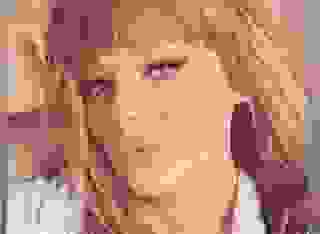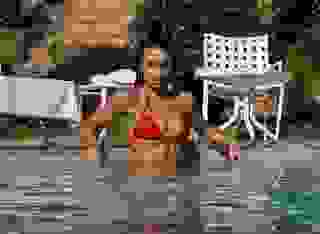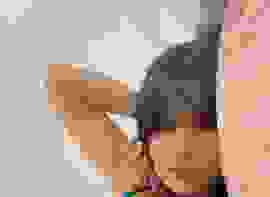Note: You can change font size, font face, and turn on dark mode by clicking the "A" icon tab in the Story Info Box.
You can temporarily switch back to a Classic Literotica® experience during our ongoing public Beta testing. Please consider leaving feedback on issues you experience or suggest improvements.
Click here"Hello?"
Silence.
The tie on my wrists was loose enough that I was able to work my hands free without difficulty. Nobody stopped me.
"Hello?"
I pushed off the blindfold, and was immediately dazzled by an electric glare that seemed to be all around me. I squinted and set about removing the rest of my bonds as I took stock of my situation.
I was in a room about the size of my bedroom, quite alone. A candelabrum hung from the ceiling with four bright bulbs; the walls were paneled with mirrors that multiplied the effect. Beside me was my purse, the contents untouched. There was nothing else on the floor but my discarded ties and a heavy rug, which concealed only well-worn timber boards.
There were no visible doors, but since I remembered walking into the room I knew there must be something, and I found it soon enough; the mirror behind me was hinged. It appeared to be locked from the other side, and after some fruitless rattling I explored the rest of the room and found another like in the opposite wall. This one was unlocked. I had no other option, so I walked through it.
I had a glimpse of a lifeless room full of indistinct gray objects; then the mirror-door swung shut behind me — I heard it latch — and after the brightness of the last room I was plunged into darkness. But not silence; there was a soft but continuous buzz of conversation, many voices speaking indistinctly. At first I thought I was surrounded by people talking in darkness, then I realized the hubbub was coming from above. Glasses clinked, feet tramped, somebody laughed raucously: unless I missed my guess, I was directly underneath a speakeasy, perhaps even one of the ones I'd visited with my friends.
As my eyes adjusted once more, I found the room was not completely dark. There were chinks of light coming through the floorboards above, and off to one side there was a high window that let in a little light, although it was too dirty for me to tell whether it was a street-light or the moon, or even bright starlight.
Once again I made out the gray shapes I had glimpsed before. This time I began to make some sense of them. They had the semblance of furniture, all covered with dust-cloths: the shape of a grandfather clock here, a writing desk there, a tall object that was most likely a wardrobe. In amongst them stood less well-defined shapes, as tall as myself. After a little thought I guessed these to be coat-racks that had been hung heavy with clothes and then shrouded with more of the same dust-cloths.
Although the evening was still young, I felt as if I had been stumbling around this place for hours, and I was becoming light-headed. It seemed a good time to stop and compose myself. I sat down on a settee and thought about how I was going to find Ruth.
As I sat there, the feeling of light-headedness only grew, developing into a kind of euphoria that had me believing I might float away entirely if I didn't hold onto my seat. Some part of my mind told me that the drink must have been drugged, but I found it hard to be alarmed by this thought; I was filled with a sort of fey abandon that said to me, What will happen, will happen.
My head spun; up above me, a piano began to play something lilting and slow. As I tried to marshal my thoughts, one of the coat-racks moved, half-hidden behind a table.
No, not a coat-rack. A figure, veiled from head to foot. It shifted forwards, very slightly, as if trying to escape notice.
Was it alone? At the edges of my vision, flickers of movement. But when I looked directly at the other draped things, they were still. My mind playing tricks on me?
"I see you," I whispered.
And the figure shuffled out from behind the furniture that obscured it, and began to move in earnest. It was a peculiar type of motion, so completely shrouded by the thick drop-cloth that I couldn't be certain what I was seeing, not even whether I was looking at this person's front or back. Now and then I thought I had it figured out: a bulge that must surely be a hand, an elbow, a knee; the next moment, the shape underneath would twist and flow, leaving me wondering if I'd been looking at nothing more than a chance fold in the cloth, a victim of pareidolia.
But whatever the detail, it was moving to the beat of the music upstairs. As it swayed and turned, a muffled female voice:
"Josephine."
"Ruth? Is that you?" Who else here could know my name?
The voice matched the piano's rhythm. "I am the first facade. I am Concealment, Sentinel, Protection. I grant shelter from all foes."
The words sparked a cascade of thoughts in my mind: the hidden entrance to this place, the blindfolds and misdirection, all to shelter it from outsiders. Hiding from storms under my childhood blanket.
But I had to know: was this Ruth, acting out some ceremony she had uncovered? Or was it another? For all I could tell through the cloth, it might as well be a speaking orang-utan. I reached out, grasped the drop-cloth, stepped back, and it slid off her form to pool forgotten on the floor.
Beneath it — had I expected to uncover Ruth's face so easily? — the figure was covered in paper, aged and crackling, sheets stuck together to form a single piece.
"I am the second facade. I am Knowledge, History, Memory. I unlock secrets, I teach the rituals." As she spoke, I could see that it was made up of pages from dozens of different books. The words collided in my consciousness, evoking memories of learning. Battles past and statesmen now dead; the discovery of helium; Euclid's axioms. As she danced the paper folded and unfolded, granting glimpses of other words that were gone again before I could be sure of them. Once I thought I saw my name; another time, I was almost certain I glimpsed Ruth's handwriting.
"Ruth! Don't play games!" I snatched at the paper and it tore, coming off in ribbons that fluttered away like moths. Beneath it another layer — thin cotton or linen? It was pale, and although it was hard to see color in the faint light, I thought it was green.
"I am the third facade." With two layers gone I could make out more of the shape now. It was close to Ruth's height, about her build, but I had never seen her dance like this. "I am Mastery, Fortune, Riches. I command empires. Gold and slaves are in my gift." The third veil felt like money between my fingers. More flashes of memory: a gift of a brand new dollar-note for my tenth birthday; the day we moved into the Boston mansion; seeing a great ship coming into harbor and understanding that my father owned it.
I tugged it loose and cast it aside. "Ruth, please." I wondered if this would go on forever, until there was nothing at all left. Underneath was satin, iridescent and sparkling even in the gloom, and where the previous layers had concealed the figure beneath, this one accentuated it. Her movements were impossibly graceful one minute, awkward and familiar the next.
"I am the fourth facade! I am Beauty, Charm, Delight! I am more glorious than the sun, more splendid than the peacock!" It glittered as I touched it, visions of colored fire sparking a powder-train in my mind. My mother's jewels, flashing diamonds and deep sapphires. My eighteen-year-old face in the mirror, primping for some beau long since forgotten. And then, crowding them out...
Ruth. Ruth, with that look of distracted inspiration that sometimes came to her in the middle of solving some great puzzle, like a mystic in a trance.
I was almost spellbound, reluctant to remove this veil. But I had come to this place with a promise to keep. The cloth was smooth and almost slipped through my fingers; when I let go, it fell like a cascade of sparks, fireworks dissipating into the darkness, and was gone just as quickly.
Underneath: white gauze, so thin as to be almost invisible. Beneath it I could make out the shape of limbs, the outline of fingers, flowing in hypnotic patterns.
"I am the fifth facade. Josephine, I am Desire... Infatuation... Lust. I am never denied." The veil looked like gossamer, but felt like warm and living skin. My head spun; I was losing my balance, falling sideways into memories that I'd never fully acknowledged.
A second cousin, rather less of a gentleman than anybody had guessed, smoother with his words than with his hands. We'd been interrupted before things went very far, and in the cold light of day I realized I had no interest in him... yet the experience had left me wondering what it might be like, to be touched and held by the right somebody.
Furtive experimentation on my own, as I puzzled over whether the "sin of Onan" applied to women too or whether we had earned our own female patron. It was pleasurable enough, but didn't sate me; nor did two cautious and short-lived dalliances with eligible young men. I had been aware of clandestine Sapphism among some of my dorm-mates at Vesey but had never thought to look for it in myself, for even the most elegant among them never quickened my pulse one iota.
And yet, all the time...
Ruth. Mousy little Ruth, so far from my notions of how Beauty would look that my slowly-blossoming infatuation had taken me quite unawares. I had thought of love as something that happened with fanfares and sudden palpitations, not something to grow so subtly inside the house of friendship. My admiration for her intelligence, the pride I took in her praise... when had these things taken fire? When did my heart cease to become my own?
"Oh, Ruth." I spoke it aloud. "What would it be like?"
My fingers still grazed the veil as we danced to the piano, now leading, now following. My partner had a certain clumsiness of gait, it must be Ruth, could only be Ruth. I pulled away the fifth veil...
Black, utmost mourning-black. It covered only her head and face, but I could not tell you how the rest of her was clad; the drink had left me addled, my attention concentrated to a pin-point. Were there flickers of movement elsewhere in the store-room?
"I am the sixth facade. I am Death, Terminus, Nemesis. I bring the end to things that are past their time."
It drew near, seeming to approach me without visibly moving, and I shrank away. Visions of mortality clamored for my attention. A bird I had found as a child, still warm but mortally wounded by our cat. Mother, confined to her sick-bed, grayer and thinner by the day. And Peter — I was never told how he had died, but in my nightmares I had seen it happen in every possible way. Now the phantasms came one on top of another: impaled on barbed wire, choking through gas-wrecked lungs, blasted into pieces by artillery, shivering from infection.
I hesitated to touch the black veil. In my distracted state I no longer knew what the rules were. Was there power in this mumbo-jumbo? Might I be struck down?
But I had come here for Ruth, and I knew only one path to that goal. When I grasped it, the black veil was no more than soft crepe, and it went the way of the other five easily enough.
As I discarded it, the light changed; the moon had risen, and was shining bright and full through that high-placed window. She stood before me, perfectly still. She had Ruth's figure, but her face was wrapped in saffron-yellow, rippling as she spoke. "I am the seventh and only. I am the final facade. Before me lies all that is false. Behind me lies all that is true. I am the gate to the Pale Lady, I keep the name of the Silent King."
"Ruth." I watched for an acknowledgement of her name. Nothing.
"Ruth, I want you." Still she stood there, impassive. I reached for her, fingers trailing down her cheek... it felt like the cashmere of Ruth's scarf. Very much like. All evidence and reason told me it must be Ruth who stood veiled before me.
Why, then, was I so afraid to expose her face? Why this blind fear that if I removed the veil I would find my Ruth gone?
"Ruth." I caressed the covered face, I stepped in and kissed her through the cloth, felt her arms settle around me. I was lost now, unable to make sense of the shadows moving around us, unable to think of anything but the face that was so close to touching mine, and of keeping my hands on her cheeks to hold the veil in place...
When I came to, I was quite alone. The piano had stopped and there was a clamor above me, heavy boots and breaking glass, men shouting. I made out a hoarse voice calling out "The bulls!" and I realized there must be a raid on the speakeasy.
I didn't know whether the police would find their way downstairs and I didn't wait to find out. I scrambled past a thousand shrouded objects, familiar shapes made alien in the moonlight; below the window, as I'd hoped, there was a door to the street. It was locked, but the wood was old and half-rotted, and the screws rusted; I wrenched the handle back and forth until the lock broke loose from the woodwork and I was able to make my exit, well away from where I'd come into the building.
I made my way back to Causeway Street and blended in with the crowd who'd gathered to watch the spectacle. There were officers in the alleyway where we'd entered and more standing guard up front, as their colleagues stomped around and hauled out the speakeasy's patrons to be loaded into a wagon. I scanned every face, looking in vain for Ruth, wondering if she'd made her escape or if she was already in the wagon by the time I emerged.
Eventually the wagon drove off, and the crowd began to disperse. I was still watching the exits, trying to figure out whether I could afford Ruth's bail without letting on to my parents, when somebody touched me on the shoulder.
"Hello, Jo."
I spun around. "Ruth! Oh, you made it!"
She looked as if she'd had a tight squeeze to escape. Her hair was mussed and she had cobwebs on her shoulder, but she still wore the yellow scarf around her neck. "Come on, Jo. Let's go home."
The next day she asked me what had happened that night after we were separated. My answers were limited; it was hard for me to be sure how much had really happened and how much had been my imagination, provoked by the unfamiliar setting and whatever had been in the drink. I told her that I'd seen a veiled woman and she'd spoken a series of invocations, but I held much back. From her questions she seemed to have at least some familiarity with the invocations, but when I asked her if she'd been there with me, she evaded the question.
Silence grew between us, blossoming into resentment on my part. One thing I knew beyond a doubt — I loved Ruth, I wanted more than friendship with her. But what to say about it? If she knew, if she had already heard my protestations, what reason could there be for her evasion? Only that my advances were unwelcome. And if not... the thoughts chased around in my head like summer-maddened dogs, yapping and snarling, driving me to distraction.
Ruth went out alone more and more, and I soon learned not to bother asking. I spent my time attending to Mama; for all our past quarrels I was very fond of her, and I was glad that we were able to settle some of our differences. I accompanied her to some of Mrs. Gardner's "dos" and met many of the movers and shakers of Boston.
At night I lay awake, thinking of Ruth, wishing I had never accompanied her to that wretched place. I was angry with her, but I loved her no less for that, and I racked my brains trying to think of a resolution. Sometimes, on the rarer and rarer occasions when we were home together, it was on the tip of my tongue to say something. But I couldn't broach the subject without encouragement, and she gave me none.
Our estrangement did not lessen after our return to Vesey, but it became more bearable when we were no longer in such close quarters. Ruth was busy with her own private work — in which I was no longer invited to assist — and I had my studies.
I was determined to work hard that year, to vindicate myself. (To Mama, to Ruth, to myself? I don't know.) And in truth, I had little else to occupy my time; over the last two years my involvement with Ruth had grown so much that I had neglected all other connections, and I had no appetite now for making the effort to repair them.
So I set myself a regular schedule and kept to it. I woke early; I studied, and made do without Ruth's tuition; I went to bed by ten every night, even if sometimes I lay awake for hours after. Twice I dreamed of that gray store-room and the veiled figure. Once it said "I am Ruth"; once it said "I am not Ruth". Both times I woke aching with regret.
I wrote to Mama and Papa once a week. At first they wrote back together, but soon Mama took to writing her own letters. She thought Papa and her doctors were keeping the truth from her, that her condition was worse than they were letting on, and I suspected she might be right. I visited again at Christmas and was shocked by how drawn and tired she had become.
In March 1927 I received a letter from Monty Summers. He was concerned about Ruth. He had heard almost nothing from her since the previous September; her only letters to him had been to ask for books she needed. He was concerned that she might be ill, or overwhelmed by her studies, and asked if I could give him any reassurance. Last of all, as an afterthought, he asked me to thank my parents once again for the hospitality they'd extended to Ruth over the Christmas just gone.
That was the final straw. I made my way to Ruth's room and banged on the door until she opened it.
"Jo, what's the matter?"
I waved the letter. "I have this from your father. He seems to believe you spent the Christmas break with my parents."
"Yes, I told him that. I'm sorry, I didn't think it'd come back to you."
"And what am I supposed to say to him?"
"I don't know. Tell him — oh, tell him what you like. It doesn't matter. Just give me a week, two weeks, before you reply. That's all I ask."
For the first time I noticed her face: pale, hollow-eyed, thin. Her room was a mess, notebooks open all over the place filled with line after line of her hand, the waste-paper basket overflowing with crumpled pages that had been torn out.
"Ruth, what is all this about?"
"Oh, Jo..." She began to reach out a hand to me, thought better of it. "I wish I could tell you, but I mustn't. Please don't be angry. Wait two weeks, and I'll give you whatever answers I can. I promise."
I left, looking over my shoulder, hoping she would say more. But there was nothing.
I saw nothing of her the next week. I asked around and learned she was absent from her classes and from meals; somebody thought she'd left town. To visit her father? I thought not. In the second week I knocked on her door daily, morning and night, and there was still no sign of her. I began to regret agreeing to her request; she was clearly not herself, and perhaps I should have let her father know as soon as he asked. I began to entertain a horrible fear that she had run off and drowned herself. It was all I could do to keep my composure.
On the Saturday night I decided I could not postpone my duty any longer. I sat down at my desk and began to write.
Dear Sir,
I must apologize to you for my delay in replying to your letter. This has arisen because...
Ten minutes later I was still considering how best to complete that "because", when I was rescued by a knock on the door.
"Hello?" I opened it. "Ruth!"
"May I come in?"
"Of course."
She was as pale as she had been two weeks ago, and shadows below her eyes suggested she hadn't slept much lately. But under it there was energy, a restless spark that I remembered from happier days. "Ruth, are you all right?"
"Listen to me, Jo. Please hear me out. I know I've hurt you. There are reasons for what I did. I'm mixed up in something and I don't want to drag you into it."
"Oh, Ruth. Whither thou goest, there I will go..."
She shook her head sadly. "I know you would, if I asked you. But not this time, I can't. Some doors can't be closed... last year I started on a path and I have to follow where it leads. To the end, no turning back. But you mustn't try to follow me. It would be a terrible mistake."








